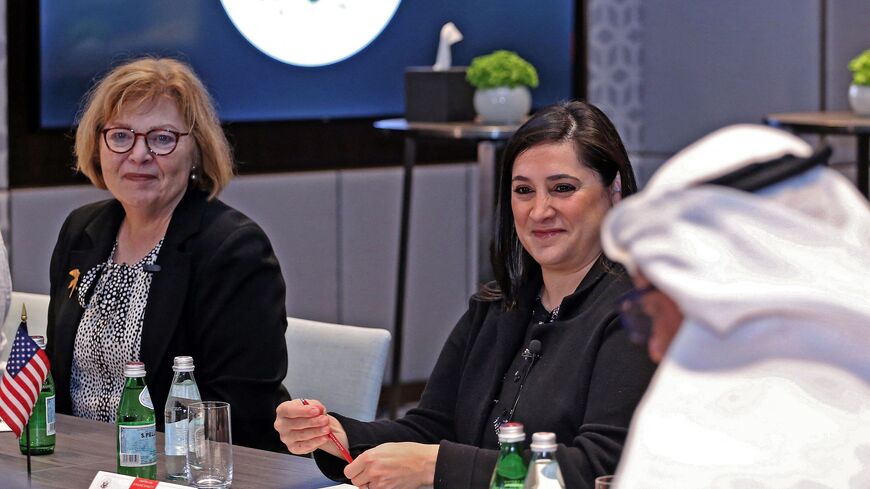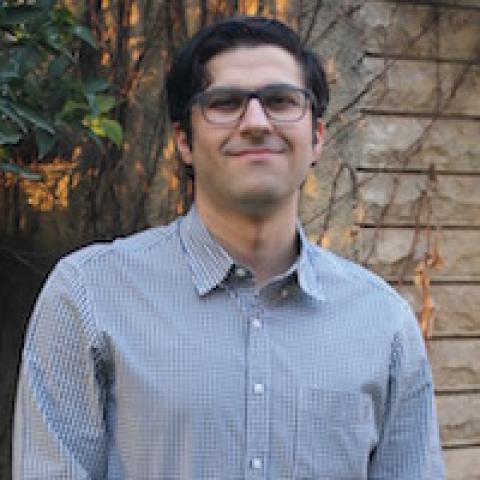WASHINGTON — Assistant Secretary of State for Near Eastern Affairs Barbara Leaf said on Thursday that the United States is not demanding its partners in the Middle East stop working with China, but it will act to stop Beijing from accessing US technology via its relations with the Middle East.
“We are not asking our friends or frenemies to choose between us and the PRC [People's Republic of China]. It’s not the Cold War,” said Leaf at the Al-Monitor Pro event at the National Press Club.
But the senior US official warned that there are "no-go" areas when it comes to cooperation with China. “We do have certain delineations of no-go areas in terms of our own high-end advanced technology … we are going to do our utmost to protect that technology."
Al-Monitor's discussion focused on China’s increasing role in the Middle East, the Iran nuclear negotiations, Syria’s improving relations with its Arab neighbors and more.
Leaf, a career US diplomat who served in the United Arab Emirates (UAE), Egypt, Tunisia and Iraq, addressed longstanding accusations that China engages in intellectual property theft. This is causing growing concern in Washington due to China improving relations with countries in the Middle East with whom the United States has strong security relations. Washington has grown particularly wary of China's growing influence on defense matters with longstanding US partners such as Israel and the UAE.
The assistant secretary said that US efforts to protect its technology may lead to tensions with friendly countries in the Middle East.
"When it comes to AI [artificial intelligence] and quantum computing and so forth, our most precious high-end technology, we're going to be very, very protective, and that may occasionally cause friction with our partners," said Leaf.
Iran and Russia, "two pariahs"
The diplomat also discussed the dormant negotiations over the Iran nuclear deal. Leaf said “the door remains open” on diplomacy to resolve the issue but that “Iran has fumbled this over and over again.” She specifically pointed to Iran’s response to protests in the country, accusing security forces of “brutalizing the public” — especially women. She also said the United States is unhappy with Iran’s support for Russia’s invasion of Ukraine.
“Iran has entered the European battle space in a highly destructive way,” she said, calling Russia and Iran "two pariahs joining together to wreak havoc."
Leaf noted International Atomic Energy Agency head Rafael Grossi's visit to Iran this month to discuss traces of near weapons-grade uranium that was allegedly discovered in the country.
“Iran has ostensibly made commitments. We’ll see if they follow through,” said Leaf on the visit.
Leaf also called for greater economic and security cooperation in the Arab world.
“You don’t have the type of cross-border trade that you should, nor do you have the type of integrated security that you really need,” she said.
In this regard, Leaf referenced drone attacks on Gulf states in recent years by the Iran-backed Houthi forces in Yemen. This situation has created a need for more air defense cooperation among Gulf states, according to her.
“We’ve talked to our Gulf partners in particular for years about integrated Arab missile defense,” said Leaf.
Syria "exporting problems"
The assistant secretary talked about Syria’s improving relations with its Arab neighbors as well. In recent years, Egypt and Gulf states have recalibrated their approach to Syria and reached out to the government of President Bashar al-Assad, including in response to this year’s earthquakes. Leaf offered advice to regional governments on this point.
"Our basic message has been [that] if you’re going to engage with the regime, get something for that,” said Leaf in reference to the Assad government.
Leaf also accused the Syrian government of participating in the trade of the drug Captagon.
“Jordanian officials publicly express their alarm about the insecurity on their border with southern Syria and the Captagon trade flourishing," she said. "In a sense, Bashar’s Syria is exporting a lot of problems.”
Leaf said she is “skeptical” that engaging with Assad in an effort to peel him away from his ally Iran will yield results.
“Some partner countries believe the best way to get at the Iran-oriented direction of Damascus is to get in there and engage and bring Syria back in a different direction. I’m skeptical that it works that way,” she said.
"Escalatory cycle" in Israel and the Palestinian territories
The Biden administration’s approach to Israel’s new right-wing government and increasing Israeli-Palestinian violence in the West Bank was also discussed. Leaf said the administration is focused on “de-escalating from a terrible escalatory cycle,” but that the issues “well predate this current government.” Israeli Prime Minister Benjamin Netanyahu returned to power in late December.
Leaf also condemned Israeli Finance Minister Bezalel Smotrich’s comments in February that the Palestinian village of Huwara should be “wiped out.” The minister made the remarks after Israeli settlers attacked the village.
"It’s just inflammatory and would be unacceptable in any setting,” said Leaf, while noting that Smotrich later walked back the comments.
Leaf said she has discussed the escalating violence with Palestinian officials, saying they “recognize they are in a cycle that has to be broken.”
Tunisia "off the democratic path"
Finally, Leaf addressed the tumultuous political situation in Tunisia under President Kais Saied.
"We have been clear he has taken the country off the democratic path," said Leaf. Saied dismissed the parliament in 2021 and has been widely accused of executing a coup as a result.
Leaf also criticized Saied's recent remarks on sub-Saharan Africans in Tunisia. Saied has accused African migrants of participating in a plot to change the country's demographics. She accused Saied of sowing a "climate of fear among the most vulnerable people in the country."







